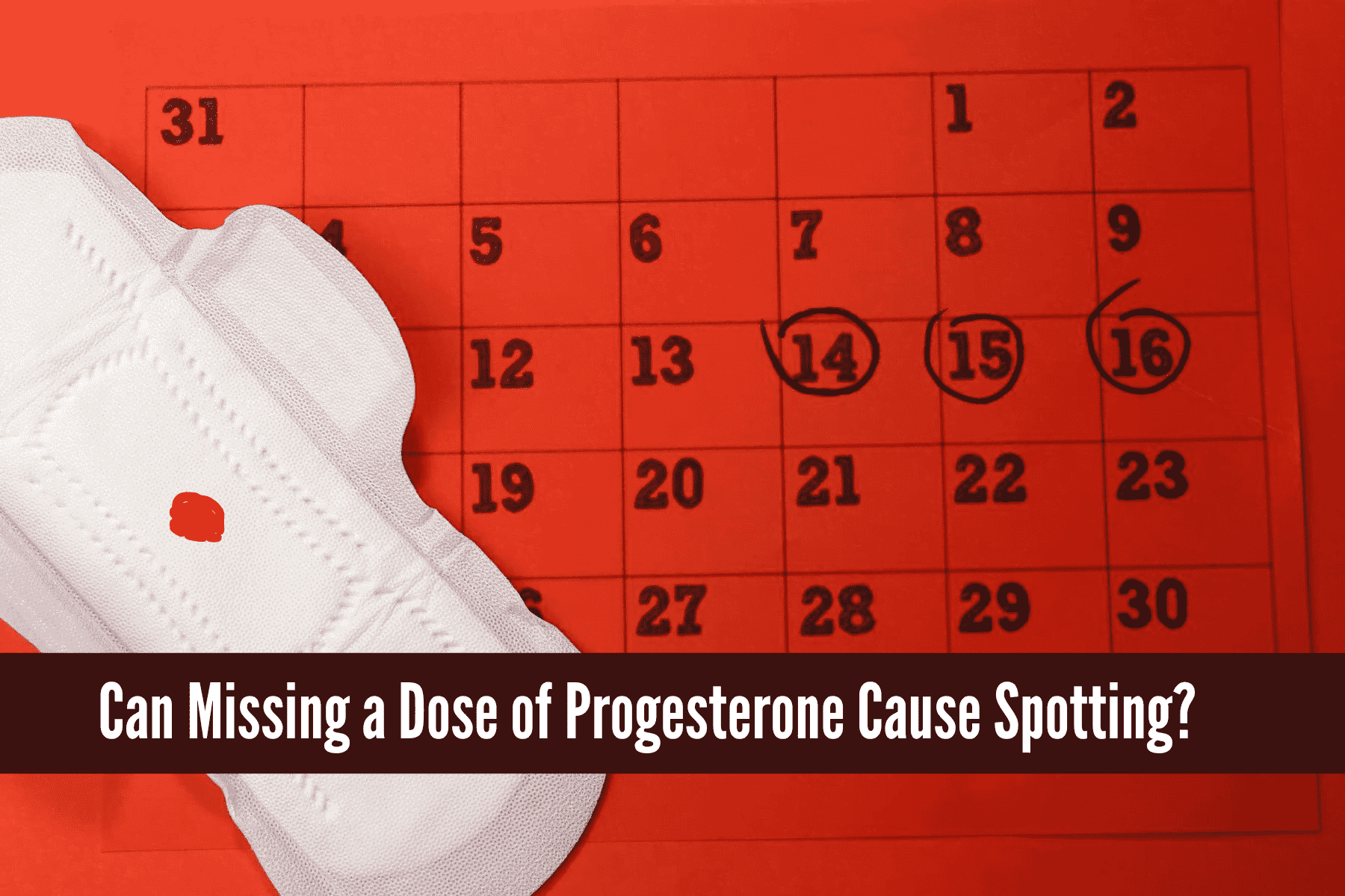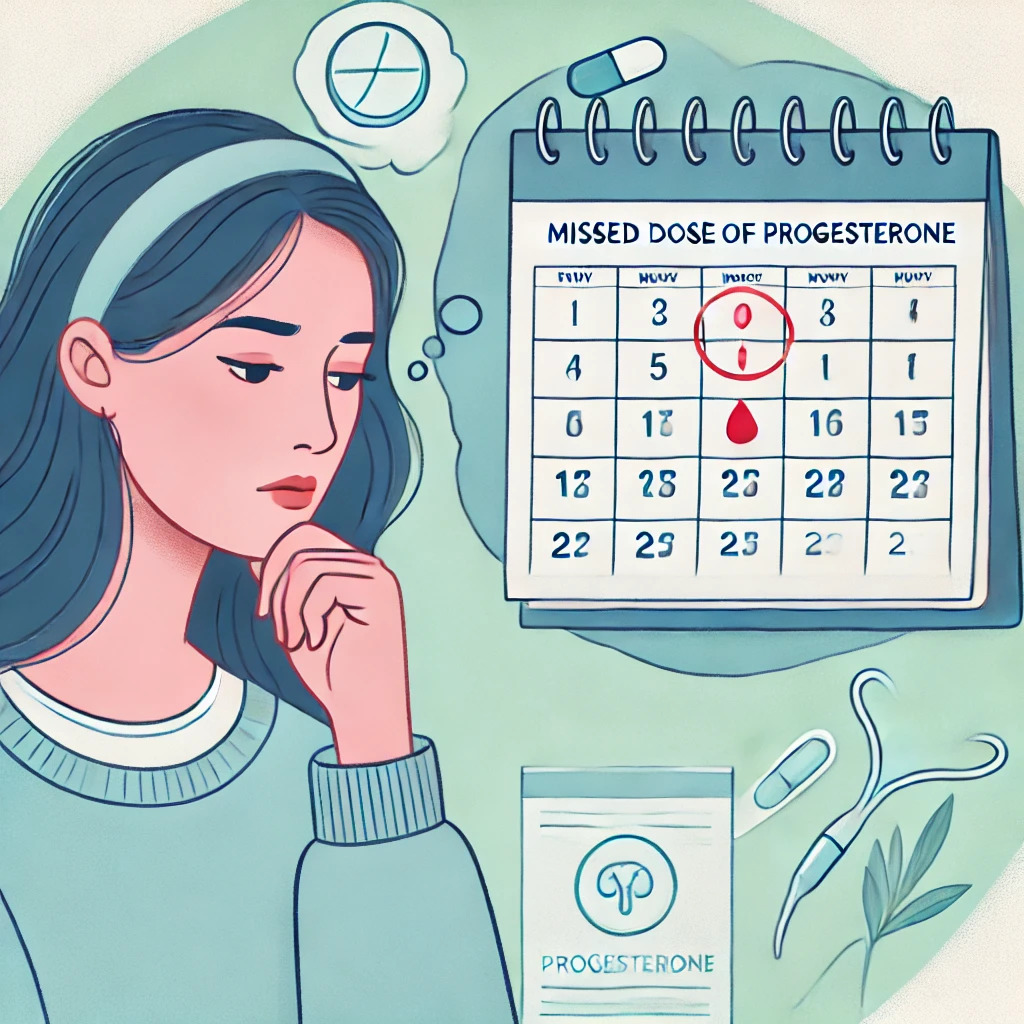Can Missing a Dose of Progesterone Cause Spotting?

Progesterone plays an essential role in female reproductive health. It helps regulate menstruation cycles, facilitate pregnancy, and ensure overall reproductive wellness.
Women experiencing low progesterone may experience symptoms such as irregular periods, difficulty becoming pregnant, and bleeding between cycles.
Spotting is light bleeding outside of your regular menstrual period that ranges in color from light pink to dark brown and can happen anytime during your monthly cycle. While spotting may sometimes be expected, it could also indicate an underlying health condition.
Understanding Progesterone
Progesterone is a vital hormone in a woman’s body. It’s produced mainly in the ovaries after ovulation and is crucial in regulating the menstrual cycle and maintaining pregnancy.
In hormone replacement therapy, progesterone helps counterbalance estrogen, reducing the risk of endometrial cancer.
Different Types of Progesterone Therapy
Several types of progesterone therapies are available for those who need hormonal support. These include oral pills, creams, and injections. Each form has its benefits and potential drawbacks, but all aim to regulate hormone levels in the body. Choosing the right type for you often depends on your health needs and lifestyle.
Why Women Use Progesterone Therapy
Many women use progesterone therapy to manage symptoms related to menopause, menstrual irregularities, and other hormonal imbalances. By stabilizing hormone levels, progesterone can alleviate symptoms like hot flashes, mood swings, and irregular periods.
The Importance of Consistent Progesterone Dosage
As mentioned earlier, progesterone is crucial in preparing the uterus for pregnancy. Missing even one dose of progesterone can disrupt this delicate balance and potentially lead to spotting or abnormal bleeding.
This is because missing a dose means insufficient progesterone in the body to support the uterine lining, leading to shedding and bleeding. This can be especially problematic for women undergoing fertility treatments where timing is crucial.
How Does Progesterone Work?
The ovaries produce progesterone after ovulation in the second half of the menstrual cycle. Its primary function is to thicken and prepare the uterine lining for pregnancy.
If fertilization does not occur, progesterone levels drop, causing the lining to shed and result in a menstrual period.
Progesterone also plays a crucial role during pregnancy, supporting the growth of the placenta and maintaining a healthy environment for the developing baby.
During this time, progesterone levels remain high to prevent contractions and keep the thick lining of the uterus.

Other Side Effects of Missing a Dose
In addition to spotting, missing a dose of progesterone can lead to other symptoms, including:
- Mood Swings: Hormonal imbalances can affect your mood, leading to irritability, anxiety, or depression.
- Breast Tenderness: Fluctuations in hormone levels can cause breast discomfort.
- Headaches: Hormonal changes can trigger headaches or migraines.
- Fatigue: You might feel unusually tired or fatigued.
What is Spotting?
Spotting refers to light bleeding that occurs outside of your regular menstrual periods. Unlike a full menstrual flow, spotting is usually much lighter and can range in color from light pink to dark brown.
It can occur for various reasons, including hormonal imbalances, changes in birth control methods, or underlying health conditions.
For women on progesterone therapy, spotting can be a sign that their hormone levels are fluctuating more than usual.
Other Possible Causes of Spotting
While missing a dose of progesterone can contribute to spotting, other possible causes should be considered. These include hormonal imbalances, underlying medical conditions such as polycystic ovary syndrome (PCOS), or abnormal growths in the reproductive organs.
It is essential to discuss any symptoms that are concerning with your doctor to rule out these potential causes.
Can Missing a Dose of Progesterone Cause Spotting?
yes, missing a dose of progesterone can cause spotting. This is because progesterone helps maintain a thick uterine lining, and when there is a sudden drop in progesterone levels, the lining may shed resulting in spotting.
However, it is essential to note that spotting can also occur for many other reasons. If you are taking progesterone supplements and miss a dose, but continue taking them as prescribed, the sudden drop in progesterone levels may not be significant enough to cause spotting.
But if you frequently miss doses or do not take your medication consistently, it can lead to fluctuations in hormone levels, which can cause spotting. It is vital to follow your doctor’s instructions and take your progesterone supplements as directed to avoid any disruptions in hormone balance.
Common Scenarios Where Missing Progesterone Leads to Spotting
- Hormone Replacement Therapy (HRT): Women undergoing HRT for menopausal symptoms often rely on a consistent dosage of progesterone to balance estrogen levels and prevent endometrial hyperplasia (thickening of the uterine lining).
- Fertility Treatments: Progesterone is frequently prescribed during fertility treatments to support the uterine lining and promote a healthy pregnancy. Missing a dose can cause a drop in progesterone levels, leading to spotting or even jeopardizing the pregnancy.
- Treatment of Menstrual Disorders: Women taking progesterone to regulate their menstrual cycles or treat conditions like polycystic ovary syndrome (PCOS) may experience spotting if they miss a dose.
Conclusion
Missing a dose of progesterone can indeed cause spotting due to the resulting hormonal imbalance. Progesterone plays a vital role in maintaining the stability of the uterine lining, and any disruption in its levels can lead to light bleeding. Adhere to your prescribed medication schedule to avoid such side effects and ensure the effectiveness of your treatment.
FAQ:
Why is progesterone prescribed?
Progesterone is prescribed for various reasons, including hormone replacement therapy (HRT), supporting assisted reproductive technologies (ART) like IVF, preventing preterm birth, and treating irregular menstrual cycles.
Can missing a dose of progesterone cause spotting?
Yes, missing your dose of progesterone may result in spotting. Progesterone helps stabilize the uterine lining, and a sudden drop in progesterone levels can lead to the shedding of the uterine lining, resulting in spotting.
What are other potential side effects of missing a dose of progesterone?
In addition to spotting, missing a dose of progesterone can lead to mood swings, breast tenderness, headaches, and fatigue due to hormonal fluctuations.
How does progesterone help in early pregnancy?
During early pregnancy, progesterone levels remain high to prevent further ovulation and maintain a stable uterine lining supporting the growing fetus.
Can missing a dose of progesterone affect my menstrual cycle?
Yes, missing a dose of progesterone can disrupt your menstrual cycle, leading to unexpected bleeding or spotting, especially if you are using it to regulate your cycle.





